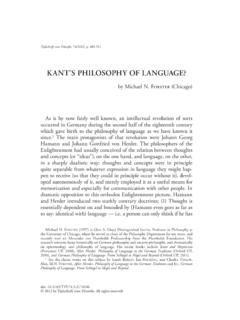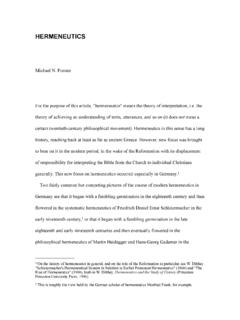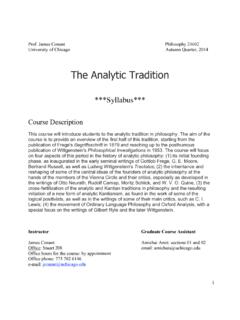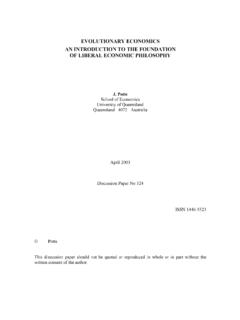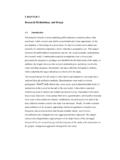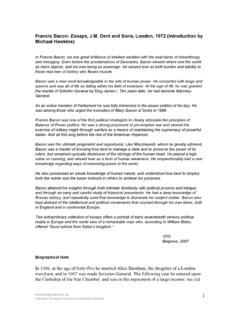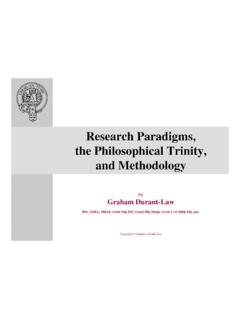Transcription of Layer-Cake vs. Transformative Conceptions of …
1 Prof. James Conant Philosophy 57605 University of Chicago Spring Quarter, 2014 !!! Layer-Cake vs. Transformative Conceptions of Human Mindedness !!**Syllabus** !Course Description !The Layer-Cake Assumption has many philosophical guises. In its guise as a thesis about the nature of our cognitive faculties and their relation to one another, it goes like this: The natures of our sentient and rational cognitive capacities respectively are such that we could possess one of these capacities, as a form of cognition of objects, without possessing the other. The underlying assumption is that at least one of these capacities is a self-standing cognitive capacity one which could operate just as it presently does in us in isolation of the other.
2 Beginning with Kant, it became important to certain philosophers to show that the Assumption forms a common ground of philosophical views thought to be fundamentally opposed to one another such as Empiricism and Rationalism. The Empiricist Variant of this guise of the Assumption might be put as follows: Our nature as sensibly receptive beings, in so far as it makes a contribution to cognition, represents a self-standingly intelligible aspect of our nature. The Rationalist Variant enters such a claim on behalf of the self-standingly intelligible character of our intellectual capacities. In particular areas of philosophy such as epistemology, metaphysics, the philosophy of mind, the philosophy of action, and the philosophy of self-knowledge each of these variants assumes a more determinate guise, while continuing to hold the fundamental assumption in place.
3 Our first concern will be to isolate, compare, and contrast the various guises of this assumption and their manner of operation both across the history of philosophy and across different areas of contemporary philosophy. Our second concern will be to consider what it would be to reject the assumption in question and what the philosophical consequences of doing so are. Our third concern will be to explore the views of a number of different authors who do seek to reject it and to assess which of these attempts, if any, are philosophically satisfactory. ! 1!Instructor !!!!!!Chalk Site Manager!!James Conant!!!!!!!Gilad Nir!!!!Office: Stuart 208!!!!!!e-mail: Phone: 773 702 6146 !e-mail: !!!Texts!!The following book has been ordered through the Seminary Co-op and is a required text for the course: ! John McDowell, Mind and World !All of the other readings will be made available through the Chalk site of the course.
4 !!!Chalk Site !There is a Chalk website for this course ( ). All readings listed on the syllabus not available in the one book ordered for the course are to be found on this site. In addition, a great many readings not mentioned on the syllabus are also to be found on this site. The latter generally pertain to topics discussed in passing in lecture and are made available for students who wish to pursue them further, perhaps in a final paper for the course. (If you ever encounter any problem obtaining an assigned reading for the course, you should immediately contact the professor or Gilad Nir by e-mail and let one of them know about the problem.) !!!!!!!!!!!! 2 Structure of the Course and Related Issues!!Recordings: All meetings of the seminar will be recorded and posted on the chalk site.
5 If you miss a meeting, you will be expected to listen to it before attending the following meeting.!!Intended Audience: This course is open to all graduate students in Philosophy. Graduate students from other departments are welcome to audit or enroll in the course for credit on the condition that they have some prior familiarity with both the history of philosophy and contemporary analytic philosophy.!!Policy on Auditors: Anyone with a serious interest in the topic is welcome to audit the course. !Announcements: Announcements (modifications to the syllabus, etc.) will periodically be posted to the Chalk site. Seminar participants are expected to keep abreast of these. !Course Requirements: Students taking the course for credit are expected to write a term paper at the end of the quarter, due by Friday, June 13th at 11:59pm, at the end of week 11.
6 Papers are to be submitted via email to Prof. Conant in electronic form. The final paper is the only official requirement for graduate students enrolled in the course. It may be on any topic of your choice pertaining to themes covered in the lecture. Graduate student papers (both M. A. and ) should be between 15 and 30 pages. !Policy on Extensions for Graduate Student Papers: Graduate students may hand in their final papers after the official due date and still receive credit for the course, only if they have secured permission from the professor to do so. Any student granted an extension should also be aware of the following: such papers will not be graded immediately upon receipt. The later the paper, the less promptly it will be graded. !Schedule of Meetings: The seminar will not meet during either the second or the ninth week of the quarter.
7 It will meet in eleventh week. !!!!!!!!!!!!!! 3 Schedule of Meetings, Topics and Readings !!First Meeting (April 1st): Organizational and introductory meeting ! introduction : Overview of the topics and themes to be covered in the course Explanation of the approach to be taken to the assigned materials Overview of the syllabus introduction to the concept of a Layer-Cake explanation No assigned reading for the first meeting. !!** NO MEETING DURING THE SECOND WEEK OF THE QUARTER !!Second Meeting (April 15th): Additive versus Transformative Theories of Rationality !Required reading: !1. Boyle, "Additive Theories of Rationality" 2. Boyle, "Essentially Rational Animals" !Recommended Reading: !1. Evans, Varieties of Reference, pp. 156 - 159 2. Velleman, The Possibility of Practical Reason, pp. 1 - 12 3. Korsgaard, The Sources of Normativity, pp. 92 - 94 !
8 !Third Meeting (April 22nd): Aristotle on Matter and Form & the Two-Body Problem !Required reading: !1. Aristotle, Physics, Book II, Chapter 1 2. Aristotle, Generation of Animals, , 734b24-735a26 3. Frey, Organic Unity and the Matter of Man ! 4!Recommended Reading: !1. B. Williams, "Hylomorphism" 2. K. Fine, A Puzzle Concerning Matter and Form" 3. Burnyeat, Is an Aristotelian Philosophy of Mind Still Credible? 4. Nussbaum & Putnam, Changing Aristotle s Mind" !!!Fourth Meeting (April 29th): Descartes on the Unity of the Human Being & the Interaction Problem !Required reading: !1. Princess Elizabeth of Bohemia and Descartes, Correspondence, pp. 63 - 71 2. Arnauld and Descartes, 4th Objections and Replies 3. Rozemond, Hylomorphism and the Unity of the Human Being" 4. Hoffman, The Unity of Descartes s Man" !Recommended Reading: !1. Alanen, Descartes s Concept of Mind 2.
9 Hoffman, "The Union and Interaction of Mind and Body , Part I & Part II 3. Aquinas, Summa Contra Gentiles & Summa Theologica, excerpts 4. Gilbert Ryle, Descartes's Myth" !!Fifth Meeting (May 6th): Kant on Sensibility and Understanding & the Myth of the Given !Required reading: !1. Engstrom, Sensibility and Understanding" 2. Sellars, Empiricism and the Philosophy of Mind, Parts I - X 3. McDowell, Hegel's Idealism as a Radicalization of Kant , Sections 1 - 4 4. Kern, Learning to Perceive" !!!! 5 Recommended Reading: !1. Sellars, Science and Metaphysics, Chapter I 2. McDowell, Woodbridge Lectures, Lectures 1 & 2 3. McDowell, Sensory Consciousness in Kant and Sellars 4. Kern, Spontaneity and Receptivity in Kant s Theory of Knowledge" !!!Sixth Meeting (May 13th): Disjunctivism & the Highest Common Factor conception !Required reading: !1. McDowell, Criteria, Defeasibility, and Knowledge 2.
10 Cook, Human Beings 3. McDowell, The Disjunctive conception of Experience as Material for a Transcendental Argument" !Recommended Reading: !1. McDowell, Singular Thought and the Extent of Inner Space 2. Lockhart, Motivating Disjunctivism 3. McDowell, Perception as a Capacity for Knowledge 4. Haddock & MacFerson, Varieties of Disjunctivism" !!!Seventh Meeting (May 20th): The Problem of Empirical Content in the Philosophy of Perception !Required reading: !1. Schlick, The Nature of Knowledge" 2. C. I. Lewis, Mind and the World Order, Ch. 2 3. McDowell, Mind and World, Chs. 1 & 2 4. Boyle, Sortalism and Perceptual Content" !!!! 6 Recommended Reading: !1. C. I. Lewis, Mind and the World Order, Chs. 1 & 3. 2. Davidson, A Coherence Theory of Truth and Knowledge 3. Brandom, "Sellars s Two-Ply Account of Observation" 4. Brandom, Making it Explicit, Chapter 4, Sections 1 - 3 !
